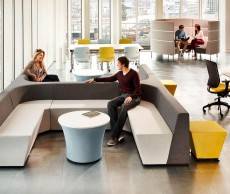June 1, 2015
Trade bodies seek to boost inclusivity and diversity with new initiatives
 Three major trade associations in the built environment sector have announced initiatives to increase the inclusivity and diversity of their respective professions. The Royal Institution of Chartered Surveyors has launched its new Inclusive Employer Quality Mark, which is designed to help firms ‘gain a competitive advantage and a diverse workforce’. Meanwhile, the Royal Institute of British Architects (RIBA) claims it has strengthened its chartered practice criteria to incorporate requirements related to equality, diversity and inclusion. From 2016, chartered practices are required to have an equality, diversity and inclusion policy. In the US, delegates at the American Institute of Architects (AIA) agreed at congress to introduce a resolution known as Equity in Architecture, that calls for measures to increase representation of what are deemed underrepresented groups ‘to move the profession forward’.
Three major trade associations in the built environment sector have announced initiatives to increase the inclusivity and diversity of their respective professions. The Royal Institution of Chartered Surveyors has launched its new Inclusive Employer Quality Mark, which is designed to help firms ‘gain a competitive advantage and a diverse workforce’. Meanwhile, the Royal Institute of British Architects (RIBA) claims it has strengthened its chartered practice criteria to incorporate requirements related to equality, diversity and inclusion. From 2016, chartered practices are required to have an equality, diversity and inclusion policy. In the US, delegates at the American Institute of Architects (AIA) agreed at congress to introduce a resolution known as Equity in Architecture, that calls for measures to increase representation of what are deemed underrepresented groups ‘to move the profession forward’.































May 29, 2015
Everything you wanted to know about open plan but were too distracted to ask
by Maciej Markowski • Comment, Facilities management, Work&Place, Workplace design
More →